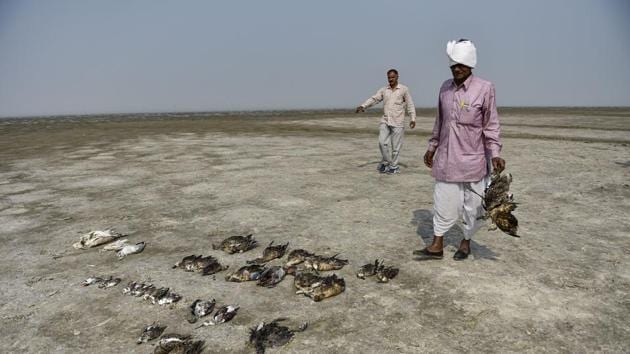Neuromuscular illness killed birds in Sambhar
The confirmation comes 11 days after the first deaths were reported and six days after the Bikaner-based College of Veterinary and Animal Science said the deaths could be because of avian botulism. Hindustan Times reported this on November 15.
The Bareilly-based Indian Veterinary Research Institute (IVRI) confirmed on Thursday that the cause of death of around 18,500 migratory birds at India’s biggest inland salt water wetland, around Sambhar lake, is botulism, a neuromuscular illness.

The confirmation comes 11 days after the first deaths were reported and six days after the Bikaner-based College of Veterinary and Animal Science said the deaths could be because of avian botulism. Hindustan Times reported this on November 15.
IVRI director Dr Raj Kumar Singh said: “We carried out lab tests on the samples we received from Rajasthan authorities. The tests confirmed that the deaths were due to avian botulism.”
The illness is caused by a toxin that is produced by the bacterium clostridium botulinum, said scientists.
In Bareilly, the IVRI director said there were several factors, which could lead to the outbreak of the toxin-producing bacteria -- large amounts of decaying plant or animal material and/or a sharp fall in water levels.
“These bacteria are harmless initially until the environmental factors and anaerobic conditions prompt them to germinate and begin the vegetative growth of the toxin-producing bacterial cells,” he explained.
Experts at the National Institute of High Security Animal Diseases (NIHSAD) in Bhopal too suspected avian botulism , but samples were sent to the IVRI Bareilly for confirmation.
The institute’s report signed by VK Gupta, joint director of Centre for Animal Disease Research and Diagnosis (CADRAD) at IVRI, said, “Based on epidemiological and laboratory, investigations, the cause of mortality in migration birds is Avian Botulism caused by Clostridium botulinum.”
So far, carcasses of around 18,500 birds have been recovered.
The IVRI report said the first dead birds recovered on November 10 were infested with maggots, “which clearly indicates that the birds must have died 10-14 days earlier”.
“Other birds that feed on these maggots have also succumbed to botulism, establishing a maggot-carcass vicious cycle,” the report added.
The report said the presence of botulinum toxin in the samples was demonstrated by mouse lethality assay.
It said the salinity of water must have been less due to heavy rains, creating a conductive environment for the proliferation of plankton, which harbor C. botulinum in their body. “Upon the receding of water levels, there must have been a mild increase in salinity levels, which must have led to the death of plankton. Upon their death, it is reported that the bacterium multiplies inside the dead planktons and there is accumulation of toxins,” the IVRI report said.
The report added that there was death in the insectivorous and omnivorous birds only.
The report said two sets of post-mortems were conducted at IVRI on November 16 and 20. On November 16, one carcass each of a Northern Shoveler, Black Winged Stilt, Common Sandpiper and Kentish Plover were examined. In the second post-mortem, two carcasses each of Northern Shoveler and Black Winged Stilt and one carcass of Common Sandpiper were examined. On November 20, serum from ailing birds and maggots from the death birds were also examined.
Rajasthan chief minister Ashok Gehlot said the situation in Sambhar was under control now. “The number of deaths is coming down. The IVRI report has confirmed the finding of the Bikaner-based College of Veterinary and Animal Science,” he said.
Gehlot said he has written to Union environment and forest minister Prakash Javadekar to request him to send secretary-level officers to Sambhar to ensure the deaths don’t recur. A team from environment ministry is visiting Rajasthan on Friday, said a forest department official who asked not to be named.
(With inputs from HTC Bareilly)





